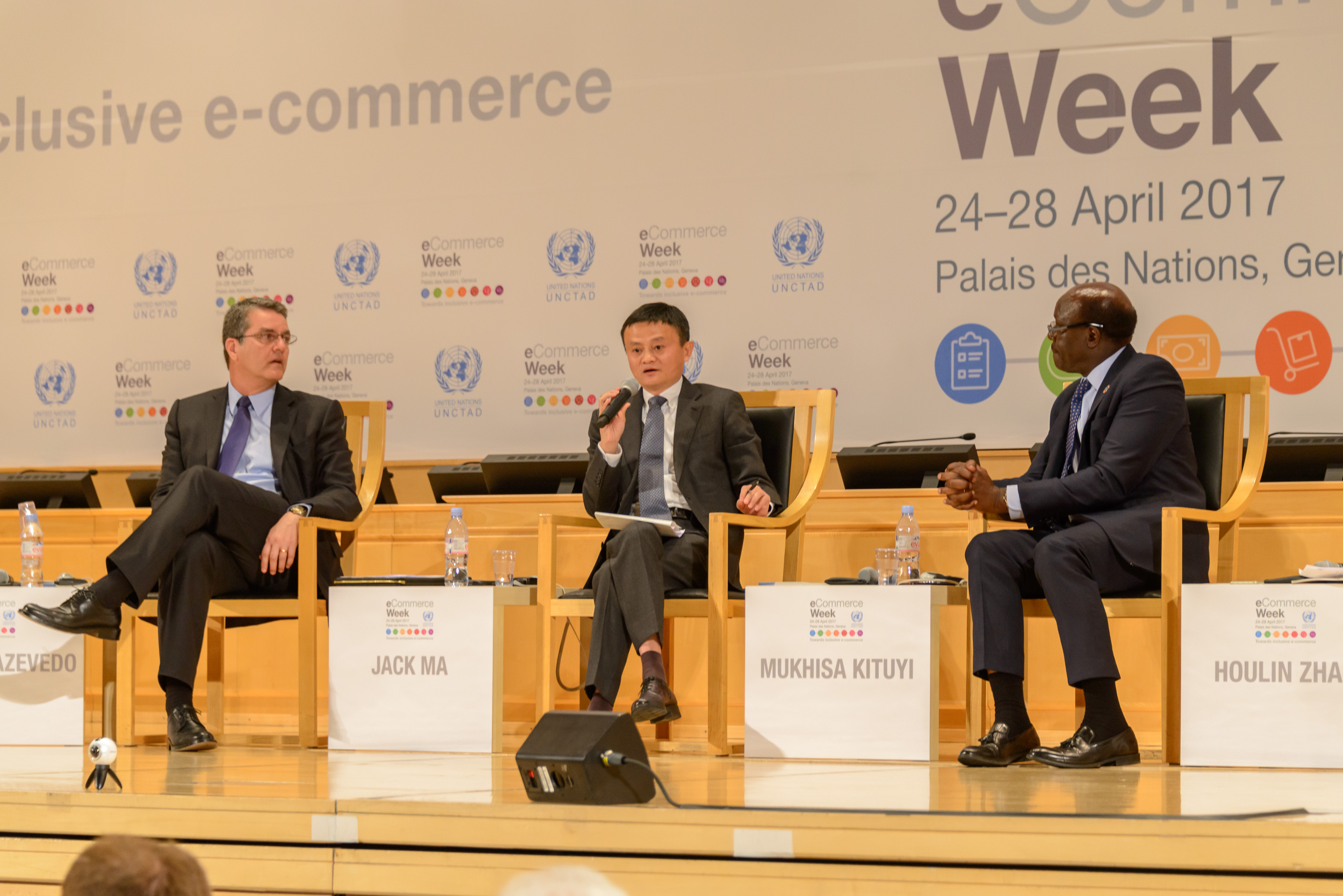
Developing countries looking to e-commerce as a way to bolster theiremergingeconomies need to prioritize the sector’s growthinstead ofcreating regulations and taxes that could kill it in its infancy, Alibaba Group Executive Chairman Jack Ma told a United Nations gathering in Geneva on Tuesday.
“We should not discipline the baby before even it was born,” Ma said.
Ma’s comments came during the United Nations Conference on Trade and Development’s (UNCTAD) annual E-Commerce Week convention, which this year focused on ways to make cross-border e-commerce more inclusive and accessible for countries that lack the technology, infrastructure, andknow-how to reap its benefits. Ma called on policymakers to propose regulations for e-commerce that specifically supported small businesses and their development.
“I hope we have regulation to encourage entrepreneurs, to encourage infrastructure investment, to reduce tax policies for e-commerce companies,” said Ma, who is also anUNCTAD special advisorfor youth entrepreneurship and small business.
The Alibaba founder appeared alongside UNCTAD Secretary General Mukhisa Kituyi and World Trade Organization Director-General Roberto Azev√™do, among others, as a part of the “Digital Transformation for All: Empowering Entrepreneurs and Small Business” panel discussion. (Click here for a recap of Ma’s one-on-one meeting with Azev√™do.) The goal of the session was to explore ideas that would help to bridge the gap between the promise that e-commerce can offer developing countries—and the small businesses that make up the bulk of their economies—and the steps necessary to help them realize it.
Ma has spent the past year calling for more inclusive e-commerce by way of an electronic World Trade Platform, which would make it easier for small and medium-sized enterprises to participate in the global economy. The eWTP would offer SMEs simple and straightforward regulations, lower barriers for entry into new markets and easier access to financing, giving them competitive support against much bigger multinational companies. In March, Ma announced the launch of the first eWTP hub outside of China, in Malaysia, making it an important first stop in an “e-road” meant to foster cross-border electronic trade.
What is the eWTP? Watch this video to find out.
Ma has repeatedly touted the benefits that e-commerce can bring to developing countries, whether by leveling the playing field between large and small companies, allowing those small companies to transcend geographic boundaries or allowing for more flexible and inclusive employment. Within China, Alibaba has said that it created 30 million job opportunities in the world’s second-largest economy, most notably among young people, rural communities and disadvantaged groups. For example, 126,000 disabled e-merchants made annual sales of RMB 12.1 billion on Taobao in 2016, according to the e-commerce giant.
“E-commerce is designed for developing countries,” Ma said on Tuesday, not for developed countries. “E-commerce is designed for those companies that will never be able to compete with big companies.”
A new report from Alibaba Group’s research arm, released in tandem with E-Commerce Week, further bolstered the argument that e-commerce can play a role in the sustainable development of still-growing economies. According to AliResearch, China is now home to nearly 40 million micro, small and medium-size enterprises, of which 5 million engage in international trade and contribute about 60 percent of China’s total export and import volume. These figures illustrate how “to a certain extent, digital technology and e-commerce have fostered a new growth model: inclusive growth,” the report stated.
To read AliResearch’s “Inclusive Growth and E-Commerce: China’s Experience” report, click here.
That growth was in no small part the result of a looser regulatory regime in China in the early days of Alibaba’s history as a company, according to Ma. “We did not have any discussion with the government for the first 10 years,” he said. The result was the growth of gross merchandise volume on all of Alibaba’s e-commerce platforms to $550 billion last year, up from $80,000 in 2003.
UNCTAD’s Kituyi pointed to an example from his home country of Kenya, noting that in an attempt to launch a mobile-money enterprise the country’s central bank and its telecommunications regulator applied for a license before truly understanding the sector they were entering. “Regulations have followed innovation,” he said, while “sometimes an overdeveloped regulatory regime stifles innovation.”
The WTO’s Azev√™do issued a similar call to action, saying that in order for trade to be inclusive the regulatory environment needed to be supportive of small businesses. Regulations had to be simpler and easier for them, he said. Otherwise “the small ones, they will be left behind.” He also emphasized that regulating was not about controlling companies so much as guiding them toward success. He used the example of mandating that fledgling business use the same industry systems and standards so that platforms are accessible across different markets, thus making them easier to use and allowing for growth.
“It’s not about impeding or harmonizing by force,” Azev√™do said. “It is enabling.”
The participation of all stakeholders is critical to the development of e-commerce in these developing countries, however. Governments, consumers, academic and entrepreneurs must work together to help developing countries sidestep problems that others, such as China and Alibaba, have already faced and overcome.
“The costs of not being collaborative at this stage is huge,” Azev√™do said.




